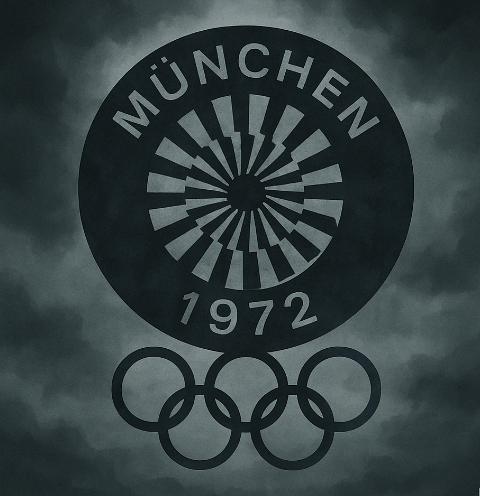
When the World Watched: The Munich Massacre of 1972
July 1, 2025 4:04 pm Leave your thoughtsOrganizers billed the 1972 Munich Olympics as a joyful global gathering where athletes flexed strength, honed skill, and chased big dreams. That sunny September 5th morning, however, everything fell apart. Eight gunmen from the Palestinian group Black September slipped into the Olympic Village, zeroing in on the Israeli team. By the end, eleven Israeli coaches and athletes, along with a German officer who tried to help, lay lifeless on the ground.
Those Games had been sold to the world as proof that sport could unite people, a sunny rebuke to the dark Berlin 1936 Olympics the Nazis had hijacked. Watching from living rooms, hotel lobbies, and crowded newsrooms, the globe could only stare in disbelief as what should have been a cheerful celebration turned into a tense hostage nightmare.
The Day That Changed the Games
At 4:30 a.m., the gunmen climbed over a fence and moved through the dark grounds like a bad dream, leaving no one to stop them. They found Apartment 1 at 31 Connollystrasse, the dorm where the Israeli squad slept, and forced the door. In seconds, nine teammates and coaches were grabbed while yells filled the hallway. Two men, coach Moshe Weinberg and lifter Yossef Romano fought back and fell, their courage snuffed out. With that, the hostage drama began, and the whole planet locked its gaze on Munich.
Talks stretched for hours while Black September stuck to its demand: release two hundred thirty-four prisoners, mostly Palestinian men locked up in Israel. For anyone watching, the tension you could feel in your gut was real, and even now, fans of betting online bettors debate how the Munich Massacre changed the games they love. Caught off guard by the out-of-nowhere attack, German police scrambled to put a response plan together. While negotiators talked, cameras swung around the village, accidentally showing armed units moving into position.
The hostage drama peeled back Germany’s security shield and showed deep cracks no one had noticed before. The Olympic Village was open to the world, and the planners had chosen easy access over heavy protection. Here is a short list of what went wrong:
- Weak Security: Just eighteen hundred guards covered the huge site.
- Media Overreach: Live TV feeds warned the gunmen about every new police move.
- Poor Planning: At that moment, Germany had no unit trained in counter-terrorism.
These blunders combined to create a perfect storm. People everywhere stopped what they were doing and quietly wished for a last-minute miracle.
Events Unfold at Fuerstenfeldbruck

Late that night, the gunmen told German officials they wanted a plane to Cairo and insisted every hostage fly with them. Commanders then parked SWAT teams and snipers along the Furstenfeldbruck runway, sure they could box the hijackers in. The plan crumbled almost at once. Scouts skipped important blind spots, shooters parked far off the best line, and team leaders hurried through the last rehearsal. When shooting exploded, chaos swallowed the tarmac: bullets zipped, a rescue chopper burst into flames, and by 1:30 a.m. on September 6, all nine hostages were dead.
News of the massacre reached the planet within minutes. More than thirty-four thousand grieving fans crowded into the Olympic Stadium for the memorial service, but the very next day, the Games resumed, a choice some still label betrayal. The tragedy also sparked a wave of change in global sports security, with events like those covered on platforms like Melbet now held under far tighter protocols. Almost every planner from London to Los Angeles reacted by tightening gates and searching so much that modern tournaments feel more like fortresses than festivals.
Munich has never lost its bite, and that horror rewrote the rules for every crowd that came after. Here are the changes it forced on sport:
- Heightened Security: Almost anywhere fans group today, you’ll find more cameras, walk-through metal detectors, and once in a while, armed staff keeping an eye out.
- Elite Response Squads: Germany first unleashed GSG 9 after the horror, an elite team now studied by police around the globe.
- Watchful Hosts: Today, every host scans the scoreboard for hazards hiding beyond the stadium walls.
The Munich massacre shattered the idea that sport exists outside world politics.
The Human Cost and Lasting Memory
Eleven Israeli men-killers, fathers, teammates, and sons-murdered in Munich were everyday people, not a headline meant to vanish overnight. David Berger, a weightlifter, left home for glory and never lifted a medal. Zeev Friedman, a twenty-eight-year-old wrestler, saw his shining future vanish the instant he stepped on the mat. Their shattered hopes show us that every medal rests on a life that can break in an instant. Families wept, nations froze, and the whole sports world promised it would never happen again.
That idea might feel odd at first, yet huge losses can reveal a quiet strength we never knew we had. When Israel’s gymnasts stepped onto the 1976 Olympic floor, they moved with calm pride that filled the room.
Small memorials hidden in the corner parks of Munich and Tel Aviv still carry those names, quietly looked at by passersby and carved deep into the stone. Supporters, whether in roaring arenas or swiping social feeds, pass along the tough spirit those athletes displayed while chasing a dream.
The 1972 attack is anything but a footnote; it beats like a quiet heartbeat at every event that follows. With every race, every game, and even that small wager we place, we silently tip our cap to all the players who gave their lives for the love of sport.
Categorised in: The Football Forum Blog
This post was written by Powered by thefootballforum.net
